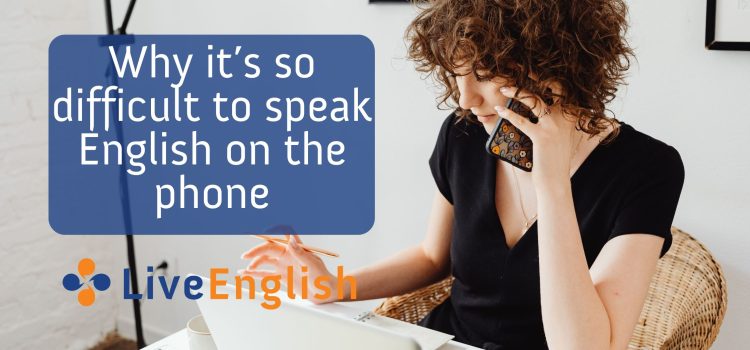
With fewer conversations taking place face-to-face, it can be difficult to express ourselves the way we intended.
Research shows that only 7% of the way our messages are received have to do with the words we choose, while 38% is connected to tone and 55% to body language.
So, the question is, as more and more of our communication is done remotely, including by phone, how can we ensure effective communication in English, without being misinterpreted, when we can’t be seen?
Our tips to speak English on the phone
Are English telephone conversations frightening?
It’s our fear of being misunderstood that scares us away from the telephone. Do you feel that people don’t trust your expertise because of your accent, despite your speaking English well? Obviously, as the person you are talking to on the phone can’t see you they have no visual cues to help them understand what you are trying to say. So, the good impression you are trying to make can only be through voice and speech, which means that the way that you speak is key to the success of your call. Hand in hand with clear speech is honesty, and it is important to let the person on the other end of the phone know if you haven’t understood something.
Tips for English phone conversations
- Speak English slowly
Speaking slowly makes for a much clearer and easier to understand phone call, allowing you to pronounce the sounds more clearly. Somehow, people are embarrassed to speak slowly for fear of being accused of a lack of knowledge! This can be more so if your native language is spoken more quickly than English. - Practice makes perfect
Select a series of words or sounds that know you don’t pronounce clearly and practice changing this. Write down what you are going to say on the phone and use a marker to underline the last consonant of every word, then practice saying what you have written. - Learn phone etiquette
Everyone has their own telephone style and tends to answer the phone in different ways. But different situations require differently phrased which will make your speech more easily understood allowing a more comfortable conversation. Of course, different cultures have different style. It is important to pay attention to the way people answer the phone or greet you when they speak to you on the phone. - Smile
A final tip is to have a smile on your face when you are conversing on the phone. This will make you sound friendlier and warmer. When we smile our mouth shape changes, as does our vocal tone.
Vocabulary for English phone conversations
For a business call you should show politeness by using the following words when making a request:
- could
- would
- can
- may
Could you please repeat that?
Would you mind calling back in the morning?
Can you call again please? I think I have a bad signal.
May I speak to Ms. Smith please?
When requesting help or information, the following words should come up in your conversation:
- please
- thank you
- thank you very much
Please hold for a minute. I have another call.
Thank you for calling, it’s great to hear from you.
Thank you very much for your help.
However, if your conversation is more informal – such as to a friend, family member, or close work colleague – then the following words are helpful:
- ‘thanks’
- ‘bye’
- ‘okay’
Thanks, John. Take care!
I’ll talk to you again soon. Bye Anne.
I’d better get going now. Talk again soon, OK?
Finally, learning English via telephone lessons with a native speaker is an excellent way to combat your fears and to ensure you have everything you need to ensure comfortable conversations in the future!







